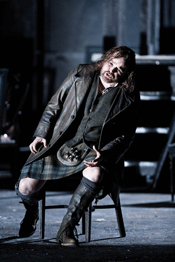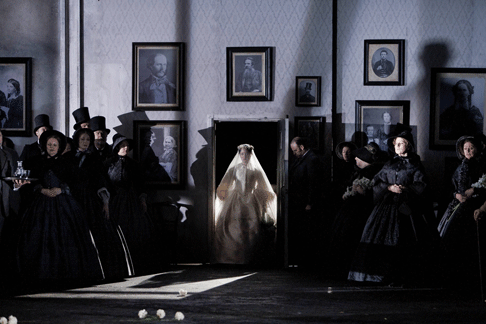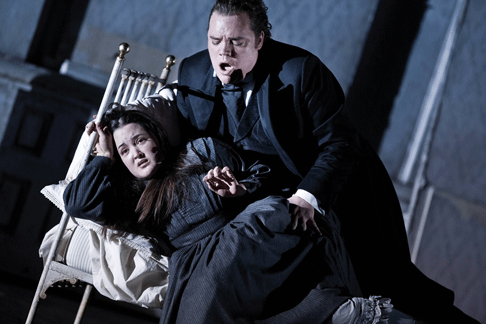Donizetti’s music is so lyrical that we could be lulled, but he understood the true horrific nature of the narrative. In his time, the glass harmonica was believed by some to induce insanity. In theory, it’s surreal drone would have added an extra frisson of danger to early performances, enhancing the dramatic impact. Restoring the glass harmonica makes good dramatic as well as musical sense, even though the full impact may be lost on modern audiences used to horror movies and the ondes martenot. This ENO production, directed by David Alden, and designed by Charles Edwards, significantly places a luminous green object left stage, glowing menacingly. It represents the glass harmonica, played in the pit by Alexander Marguerre, one of the few glass harmonica specialists in the world. It reaffirms the importance of the musical character in this opera.
Two centuries of flamboyant performance practice have shaped our assumptions, but the evidence is that Donizetti’s approach was more restrained. There’s plenty of drama inherent in Lucia’s personality, so this production shifts the balance back to the inherent drama in Donizetti’s music. Anna Christy’s high soprano isn’t as magnificent as, say, Maria Callas, but it fits well with the cleaner bel canto aesthetic. Christy also evokes the fragility so fundamental to Lucia’s personality. Her timbre is clean and pure, almost shrill at times, but that’s psychologically astute. When Lucia finally breaks down in wild frenzy, it’s all the more disturbing.
 Barry Banks (Edgardo)
Barry Banks (Edgardo)
This Lucia’s still in the nursery, playing with dolls, wearing a dress that shows her ankles. When Enrico (Brian Mulligan) fondles her legs, it shocking. But then selling his sister into marriage is shocking too. Nonetheless, Enrico recoils in horror at what he’s done and regresses, playing with a toy cart. Mulligan’s baritone is surprisingly delicate, so even if his physique isn’t child-like, he conveys the idea that Enrico — just like Lucia — doesn’t want to grow up and face the struggles that adulthood brings..
Donizetti Italianizes Sir Walter Scott’s fantasy of Scottish myth. Because the setting is ambiguous, this set design (by Charles Edwards) plays an important role in commenting on and expanding the themes implicit in the drama. What we need to know is that once powerful , families have been destroyed. In hues of grey, green and white, we see the faded glory of a marble mansion falling into ruin, paint peeling, windows boarded. Lammermoor is on the brink of collapse. Lucia is being traded off so the family can survive. Enrico’s not a craven brute, but a victim of overwhelming circumstances.
 Anna Christy (Lucia) and Company
Anna Christy (Lucia) and Company
The mad scene takes place in an alcove above the main stage, complete with curtained backdrop. The marriage chamber becomes a stage where the ritual of marriage is acted out. This is Lucia’s “sacrifice” on the altar of social pressure. Even though Arturo is kind, losing her virginity is an act of violence, to which Lucia responds with extreme force.
Lucia is clearly unstable long before the wedding. She sees the ghost of a dead maiden, and falls suddenly in love when Edgardo kills a wild animal at her feet. Blood, love and death inextricably linked. Even in Donizetti’s time, some would have intuited the connection, but the Victorian costumes (Brigitte Reiffenstuel) in this production allude to images of rigid respectability. Beneath the buttoned up bombazine, sexual repression corrodes, just like the rusting windows in the Ashton mansion. Obviously, Lucia wants to die because she’s let Edgardo down by signing the marriage contract. But she’s also choosing death to avoid losing her innocence.
Edgardo (Barry Banks) is just as weighed down by family tradition as Enrico is, but he’s already lost everything but his father’s tomb. Here he’s dressed in a kilt, the last remaining wild Highlander in a new world of Victorian propriety. Walter Scott’s novels about a lost past appealed to the Romantic imagination because they offered an alternative to convention, in an era before there was a vocabulary for psychological concepts. Perhaps that’s why Alden has Edgardo killing himself with a gun instead of a sword. Edgardo, a throwback to a wild Highland past, can’t buck “modern” society.
 Anna Christy (Lucia) and Brian Mulligan (Enrico)
Anna Christy (Lucia) and Brian Mulligan (Enrico)
With Lucia, Edgardo and Enrico destroyed, the future, as such, rests with figures like Raimondo Bidebent (what a name!). Clive Bayley’s portrayal is sympathetic — no Calvinist hellfire and brimstone here. Even when he attacks Normanno (Philip Daggett), he’s not specially vindictive. But he doesn’t understand the passion that drove Lucia and Edgardo. Something’s been lost in this new world of genteel reticence.. This superb production of Lucia di Lammerrmoor does justice to the drama and to the depth of Donizetti’s music, revealed in this lucid new edition.
Anne Ozorio
![Anna Christy as Lucia [Photo by Robert Workman courtesy of ENO]](http://www.operatoday.com/Lucia_di_Lammermoor_001.gif)


